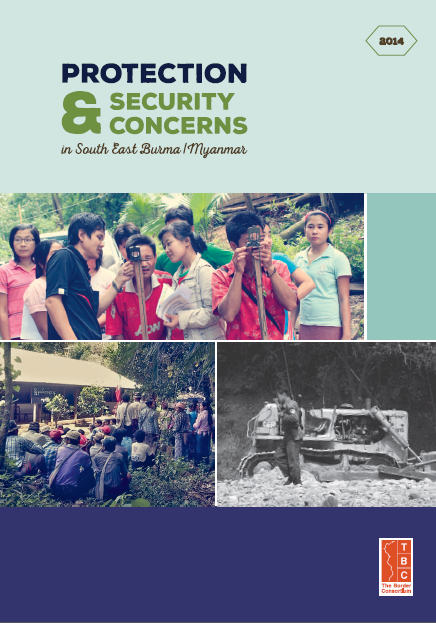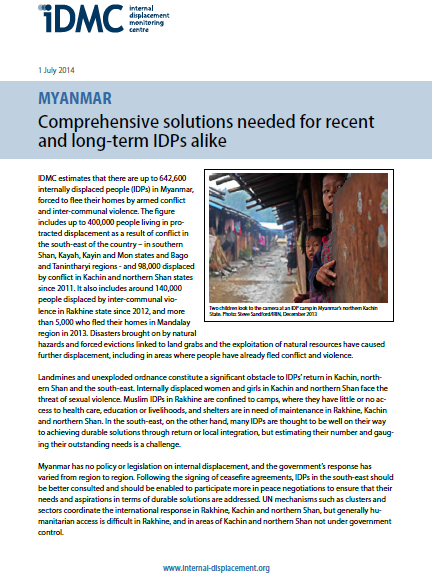Posts Tagged ‘United Wa State Army’ (8 found)
Military Confrontation or Political Dialogue: Consequences of the Kokang Crisis for Peace and Democracy in Myanmar
The renewed violence in the Kokang region of the northern Shan state in February 2015 has had serious repercussions for efforts to solve ethnic conflict in Burma/Myanmar and end the decades-old civil war. The fighting started when troops led by the veteran Kokang leader Pheung Kya-shin (Peng Jiasheng) resurfaced in the Kokang region and attacked government and army positions after an interval of nearly six years […]
• • •Special Representative of the Secretary-General for Children and Armed Conflict, Leila Zerrougui, Concludes Her First Visit to Myanmar
The United Nations Special Representative of the Secretary-General (SRSG) for children and armed conflict, Leila Zerrougui, concluded a five-day visit to Myanmar today. Her first visit to the country, at the invitation of the Government, aimed to assess the impact of the conflict on children in accordance with United Nations Security Council resolution 1612, focusing in particular on the implementation of the Joint Action Plan (JAP) signed in 2012 by the Government and the Country Task Force on Monitoring and Reporting (CTFMR) to end and prevent the recruitment and use of children by the armed forces of Myanmar (Tatmadaw). The SRSG visited Nay Pyi Taw, Yangon, Mandalay and Myitkyina (Kachin state) […]
• • •The Significance of Signing the Deed of Commitment to Peace and National Reconciliation
On Union Day, February 12, 2015, the President, senior Tatmadaw officers, both speakers of the Hluttaws, political parties, and four Ethnic Armed Organizations (EAOs)—the Restoration Council of Shan State, Karen National Union, Democratic Karen Benevolent Army, and KNU/KNLA Peace Council—signed the Deed of Commitment to Peace and National Reconciliation (the “Deed”) at Naypyidaw. By signing the Deed, the President is able to demonstrate a positive image to the country and the international community that Burma’s peace process is moving forward in advance of the election later this year […]
• • •Protection and Security Concerns in South East Burma/ Myanmar
The peace process in Burma/Myanmar1 is at a critical juncture from which it could evolve into a transformative national dialogue or splinter into a divisive charade. While hopes for substantive and inclusive discussion about structural injustice remain, ongoing militarisation and attacks by the national armed forces2 are undermining the confidence of ethnic stakeholders. This report seeks to highlight the protection and security concerns of conflict-affected communities. […]
• • •Myanmar: Comprehensive Solutions Needed for Recent and Long-term IDPs Alike
IDMC estimates that there are up to 642,600 internally displaced people (IDPs) in Myanmar, forced to flee their homes by armed conflict and inter-communal violence. The figure includes up to 400,000 people living in protracted displacement as a result of conflict in the south-east of the country – in southern Shan, Kayah, Kayin and Mon states and Bago and Tanintharyi regions – and 98,000 displaced by conflict in Kachin and northern Shan states since 2011. It also includes around 140,000 people displaced by inter-communal violence in Rakhine state since 2012, and more than 5,000 who fled their homes in Mandalay region in 2013. Disasters brought on by natural hazards and forced evictions linked to land grabs and the exploitation of natural resources have caused further displacement, including in areas where people have already fled conflict and violence.
Landmines and unexploded ordnance constitute a significant obstacle to IDPs’ return in Kachin, northern Shan and the south-east. Internally displaced women and girls in Kachin and northern Shan face the threat of sexual violence. Muslim IDPs in Rakhine are confined to camps, where they have little or no access to health care, education or livelihoods, and shelters are in need of maintenance in Rakhine, Kachin and northern Shan […]
• • •ဝ ျပည္ေသြးစည္းညီညႊတ္ေရးပါတီ ႏွင့္ ကရင္အမ်ဳိးသားအစည္းအရံုး ပူးတြဲေၾကညာခ်က္
ဝ ျပည္ေသြးစည္းညီညႊတ္ေရးပါတီႏွင့္ ကရင္အမ်ဳိးသား အစည္းအရံုးတို႕သည္ ဝ ျပည္နယ္ ပန္ဆန္းျမိဳ႕၊ ပါတီဗဟို စည္းေဝးခန္းမတြင္ ျမန္မာျပည္ျငိမ္းခ်မ္းေရးတည္ေဆာက္မႈဆိုင္ရာ လုပ္ငန္းစဥ္ႏွင့္ ပတ္သတ္၍ မိမိတို႕၏ အျမင္ သေဘာထားမ်ားအား ပြင္းလင္းလြတ္လပ္စြာ ေဆြးေႏြးတိုင္ပင္ခဲ့ၾကပါသည္ […]
• • •Five-Point Agreement with the United Wa State Army
The full text of the agreement between the Union Peace Working Committee and the United Wa State Army (UWSA) in Burmese language.
• •People Begin to Flee Homes Under Threat of Civil War
The situation in north-eastern Burma is becoming increasingly tense and unstable as yet another set of deadlines pass, by which ethnic ceasefire groups were supposed to join the junta’s Border Guard Force (BGF) under the command of the SPDC Army. On 25 April, the National Democratic Front, made up of 8 ethnic armed groups, released a statement rejecting the BGF proposal and demanding that the junta end its military operations and intimidations in ethnic areas. The Kachin Independence Organization/Army, the United Wa State Army (UWSA) and the National Democratic Alliance Army (NDAA, aka Mongla) also remain resolute in their opposition to the junta’s proposal and stand by their counter proposals, which have been dismissed by the regime.[…]
• • •










 All posts
All posts